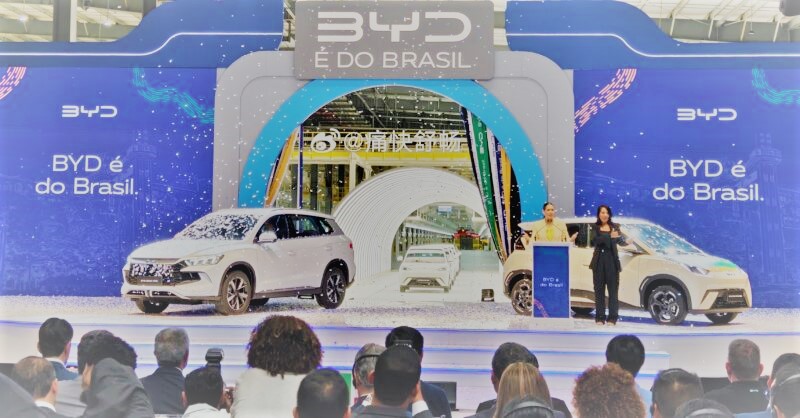BYD Officially Kicks Off Local Assembly
BYD begins EV production in Brazil with the first Dolphin Mini rolling off the assembly line at the new Camaçari plant in Bahia on July 1, 2025. This marks BYD’s first complete manufacturing operation outside Asia.
Investment and Production Capacity
As BYD begins EV production in Brazil, the company has invested around R$5.5 billion (approximately $1 billion USD) to convert the former Ford plant into a cutting-edge factory. This facility is designed with a production capacity of 150,000 units annually, featuring 26 buildings, a test track, and SKD assembly lines to support efficient electric vehicle manufacturing.
EV Models Assembled in Brazil
The initial lineup includes:
- Dolphin Mini (aka Seagull) – compact electric car priced around R$118,800 (~$21,800).
- Song Pro – BYD’s popular plug-in hybrid SUV, already performing well since mid-2024.
- Chaser 05 (King DM-i) – another PHEV model that started local production on the same day.
Localization Strategy and Market Impact
BYD aims to reduce import taxes by localizing production. Currently, Brazil imposes tariffs of 25–28% on fully built imported EVs. BYD also plans to increase local content by working with suppliers such as Continental and Brazilian auto parts manufacturers.
Job Creation and Economic Boost
The plant currently employs 1,000 workers and plans to hire 3,000 more in the coming months. In total, up to 20,000 jobs are expected to be created both directly and indirectly once the plant reaches full capacity.
Labor Concerns and Initial Delays
BYD’s Brazil launch faced delays due to labor violations by local subcontractors, including reports of modern slavery conditions. After investigation, BYD replaced the contractors, relocated workers, and resolved licensing issues before proceeding with production.
Conclusion: BYD Accelerates EV Expansion in South America
With BYD starting EV production in Brazil, the company strengthens its position in Latin America’s growing EV market. Despite challenges, BYD’s strategic investments and local assembly mark a new chapter in clean mobility across the region.



